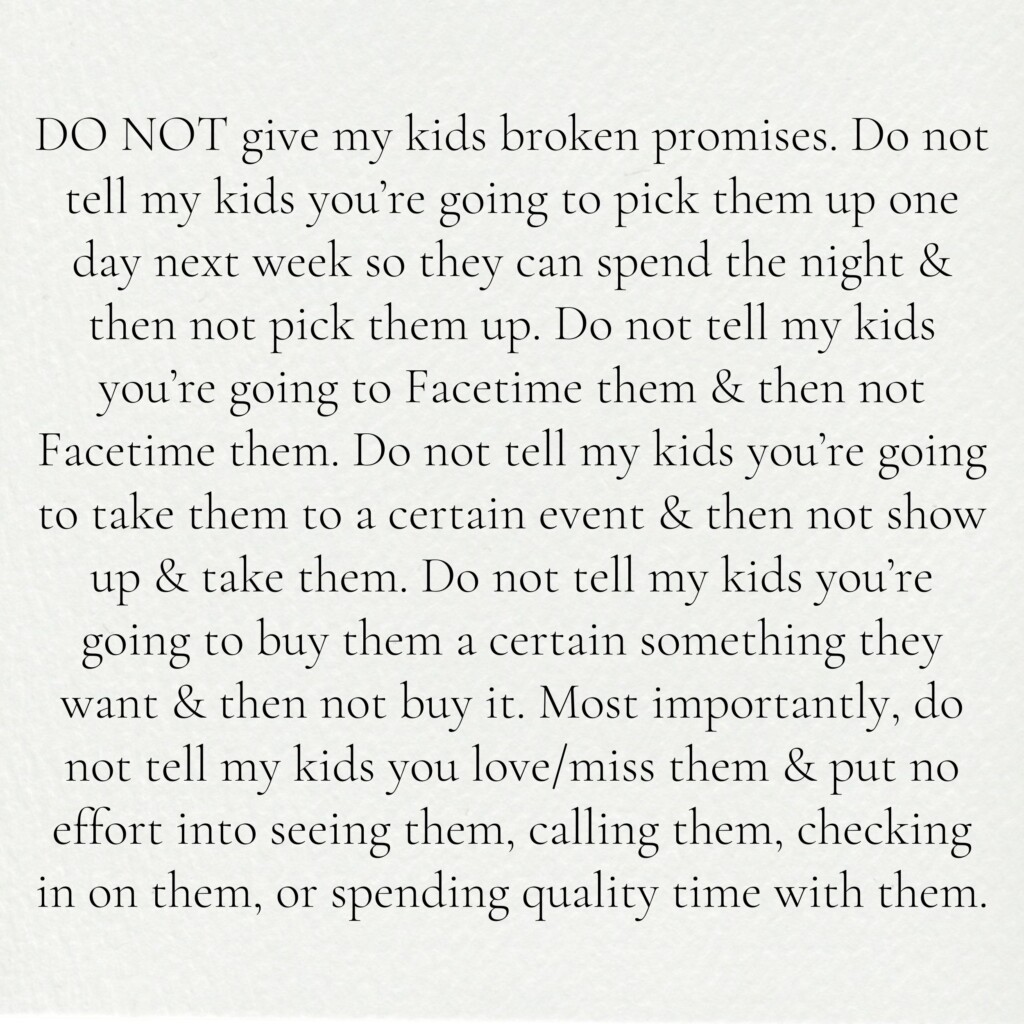In the intricate web of relationships, few things hold as much weight as the promises we make to our children. As parents, caregivers, and role models, our words shape their understanding of trust, love, and reliability. The phrase “Do Not Give My Kids Broken Promises” resonates deeply with the shared sentiment of parents everywhere—delivering on our commitments is essential for nurturing a strong, trusting bond. Let’s explore the significance of staying true to our promises and the profound impact it has on our children’s emotional well-being and sense of security.

Promises as Building Blocks:
Promises are more than words; they are the foundation upon which relationships are built. When we make promises to our children, whether it’s picking them up, spending quality time, or fulfilling a desire, we create a bridge of trust between us and them. Keeping these promises not only fulfills their expectations but also communicates that their feelings and needs matter to us.
The Weight of Unfulfilled Promises:
When promises are broken, the effects ripple through a child’s emotional landscape. Disappointment, confusion, and a sense of being let down can erode their trust in our words and intentions. Unfulfilled promises can sow seeds of doubt and uncertainty in their minds, leading to questions about their own worth and the authenticity of our affection.
The Art of Consistency:
Consistency is the cornerstone of parenting. Children thrive in environments where routines are predictable, and they can anticipate our actions. When we consistently keep our promises, we provide them with stability and a sense of safety. It reaffirms that our love is steadfast and that they can rely on us in times of need.

The Importance of Open Communication:
As parents, it’s vital to communicate openly and honestly with our children. If circumstances prevent us from fulfilling a promise, explaining the situation to them in a sensitive manner is key. Transparency helps them understand that life sometimes brings unexpected challenges, but our commitment to them remains unwavering.
Promises Reflecting Love and Care:
Promises made to our children reflect our love and care for them. When we commit to spending time, showing up at events, or fulfilling their wishes, we demonstrate that their happiness is a priority. These actions not only deepen our connection but also impart valuable life lessons about responsibility, accountability, and the power of our words.
Creating Lasting Memories:
Fulfilling promises creates memorable moments that linger in a child’s heart. Whether it’s a simple outing, a heartfelt conversation, or a cherished gift, these experiences become building blocks of their self-esteem and emotional resilience. The memories of shared moments become touchstones they carry with them throughout their lives.
The Ripple Effect of Trust:
By keeping our promises, we lay the groundwork for a strong parent-child relationship that extends far into the future. Our children learn the value of honoring commitments and respecting others’ feelings. The trust they develop with us serves as a model for their interactions with friends, partners, and their own children.

Nurturing Bonds through Consistency
The pledge to “Do Not Give My Kids Broken Promises” is a reminder of our responsibility as parents to nurture our children’s emotional well-being through consistency and authenticity. By staying true to our commitments, we create an environment of trust, security, and love. Our words hold immense power, shaping the narratives of our children’s lives. Each promise kept reinforces the notion that they are cherished, valued, and worthy of our time, attention, and affection. So, let’s continue to make promises we can fulfill, and in doing so, plant the seeds of unwavering trust that will flourish in their hearts for years to come.
As an Amazon Associate we earn from qualifying purchases through some links in our articles.




